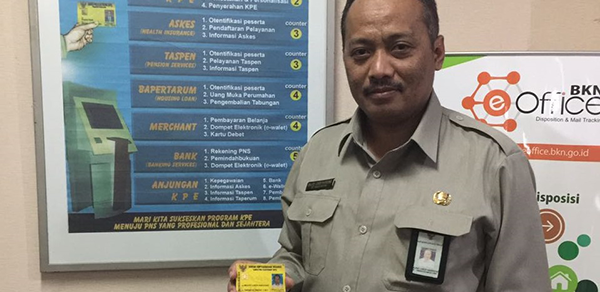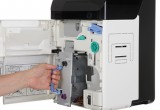Indonesia smart card IDs provide banking services to civil servants
11 October, 2017
category: Contactless, Digital ID, Government, Smart Cards
In Indonesia smart card IDs are rolling out to millions of government workers, pointing the way forward for future closed systems that offer identification and payment authentication. The technology is provided by HID Global and its deployment of those cards has come at a lower cost than similar projects, according to the company and the Indonesian agency overseeing the effort.
Indonesian officials and HID needed about nine months to deploy the printing system and another three months to print and encode the smart ID cards
HID Global won a contract from the State Employment Agency of Indonesia, Badan Kepegawaian Negara (BKN), to provide Fargo HDP5000 smart card printers to produce the contact chip-based identification documents for some 4.5 million current and retired Indonesian civil servants. The smart card, named the Kartu PNS Elektronik (KPE) card, stores personal and banking information, enabling users to withdraw salary or pension funds from ATMs, make debit payments within government buildings and prove their identities. The chips on the smart card IDs carry a private key that is exclusive to BKN.
“The HDP5000 addresses one of the most common pain points for IT deployments—cost,” HID says. “The low operating cost allowed BKN to issue KPE cards to all government employees while maintaining a lean budget. Procurement of supplies is also simplified, as now BKN sources all its printing supplies from a single local partner.”
Indonesia smart card ID deployment and printing
Indonesian officials and HID needed about nine months to deploy the printing system and another three months to print and encode the smart ID cards, says Lee Wei Jin, regional director, Secure Issuance, Asia-Pacific, for HID Global, in a recent interview with OpenGovAsia.com.
“The challenges will be to make sure all the sub system can work properly after the installation of the main database system,” he says. “They also need to make sure the cards are distributed at the same time to all 4.5 million workers before they can start implementing the full system.”
That said, the printing system for the Indonesia smart card IDs are easy to use and “highly intuitive,” says Bajoe Loedi Hargono, Director of System Information Development at BKN. “The printers are hardly different from printing a regular document. We can encode and print our cards effortlessly,” Hargono says. “Moreover, the way which the HDP5000 prints the cards makes the cards very durable and tampering almost impossible. So far we’ve only learned of only a few incidents where we had to issue a replacement card to the user.”



